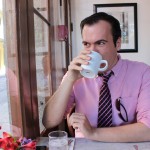As any first year student can attest, the life of a freshman temporarily revolves around the first year seminar, which is a required component of the SAGES curriculum. Each of these seminars attempts to attract students with interesting course descriptions and catchy titles; mine asked if history mattered.
The weekend prior to Homecoming weekend, the staff of The Observer received a message from Paul Kerson, the paper’s first news editor, who helped launch the publication in 1969, just as Case Institute of Technology and Western Reserve University had “merged” to become one.
Six days after his initial message, Kerson was seated in front of a circle of Case Western Reserve University students, faculty, and staff, discussing what it was like forging a college newspaper at one of the most turbulent times in U.S. history.
The founder of his New York law firm and the former assistant attorney general for the state of New York, Kerson was joined by vice president emeritus for public affairs, university historian, and SAGES fellow Richard Baznik.
From the distribution of draft cards in Adelbert Gym to the rampant prospect of war threatening the university’s male community, their discussion revealed that CWRU was anything but boring between 1969 and 1972.
“National news was made at CWRU or by CWRU students in those years,” Kerson explained. “I covered the Woodstock Music and Art Festival in August 1969, the Great March on Washington in November 1969, the National Student Mobilization Committee Convention at CWRU in February 1969, and the Kent State shootings and subsequent partial closure of CWRU in 1970.”
Forty years later, I can’t help but wonder how this editorial board or the student body of this university community would react under such social pressure. Put frankly, I have to wonder if a call to action would be rejected or embraced, a question I think only reality could answer.
After all, compared to the historic events that have unfolded across campus fields and in building corridors, our current era may be judged as insignificant. Not by me.
Rather, if it is one lesson I learned in our founder’s visit, it is that every effort taken in the name of this university or one of its student organizations does not occur in vain. We may not be living during the Vietnam War or a particularly impactful era, but we are shepherding the organizations and institution that were founded and safeguarded by students who did.
As CWRU’s current undergraduates, we are responsible for ensuring that the work of the alumni who came before us is maintained. We are entrusted with leaving this campus in better condition than when we found it for the benefit of future students.
When my first-year SAGES seminar concluded my freshman year, the meaningfulness of history had been yet to be determined. No finite answer was decided, and we were left to draw our own conclusions.
Meeting the man who started this newspaper and helped create the shoes that I now fill changed my perception of history. And his aged face and still unyielding passion finally allowed me to reach an answer.
History matters.


